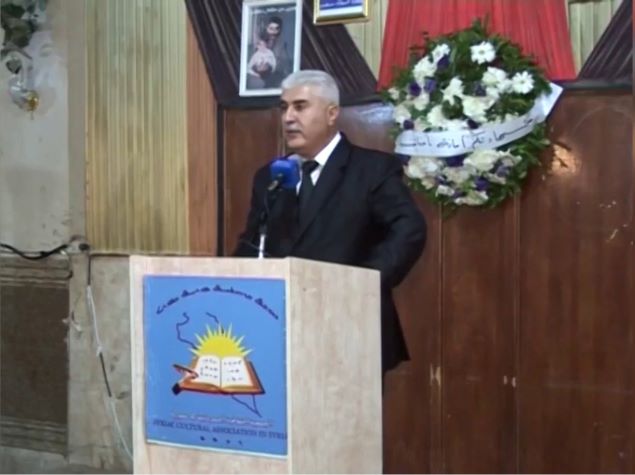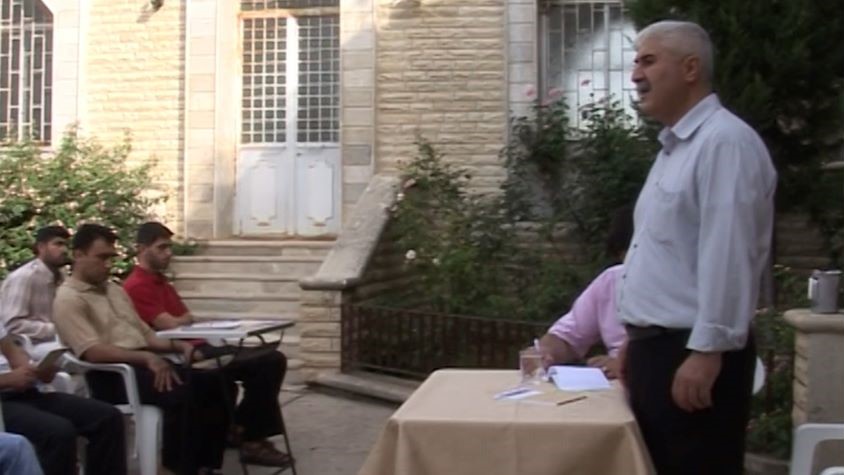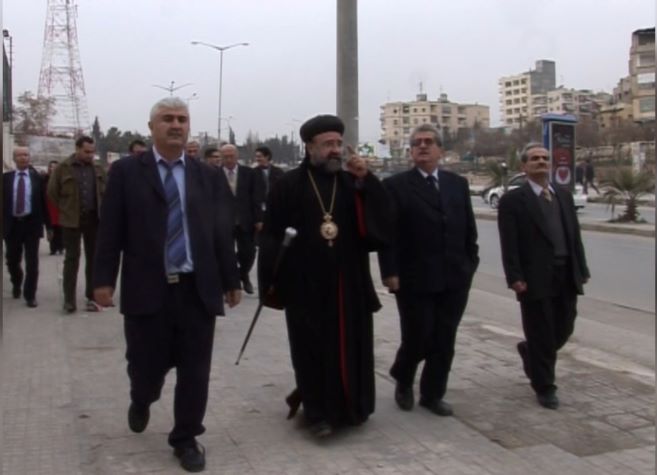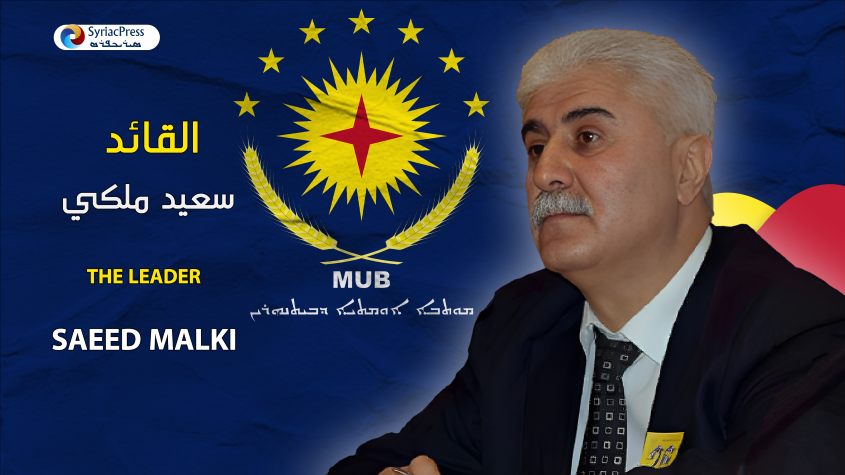A Voice Unsilenced: The Journey of Saeed Malki
A series about influential Syriacs in the modern history of Syria
NORTH AND EAST SYRIA — Beneath the skies of Beth Zalin (Qamishli) and across the expanse of the Gozarto (Jazira) Canton, where the scent of jasmine mingles with the breath of Syriac (Aramean–Assyrian–Chaldean) history, a dream was born in the heart of a man who was no ordinary leader but a symbol of resilience and hope. Saeed Malki, a son of Beth Nahrin (Mesopotamia), wove with his words and sacrifices a story whose echoes still resonate in the hearts of his people. From his childhood in exile to his struggle on homeland soil, Saeed was a beacon illuminating the path to freedom until the Syrian regime attempted to extinguish it in a tragic moment that did not end his legacy but immortalized it.
Beginnings Steeped in Nostalgia
Saeed was born in Beth Zalin, in the cradle of Syriac (Aramean–Assyrian–Chaldean) civilization in Gozarto. However, harsh circumstances forced him and his family to migrate to Switzerland when he was nine. In the streets of exile, he listened to his parents’ tales of Beth Nahrin — its ancient churches and Syriac hymns carrying the spirit of ancestors. Those stories planted in his heart an unyielding longing for home. Saeed grew, studied, and worked, yet his soul remained tethered to the alleys of Beth Zalin and the fields of Gozarto.
In the 1990s, Saeed encountered the Bethnahrin National Council (Mawtbo Umthoyo d’Bethnahrin, MUB), an organization championing the unity of the various Syriac (Aramean–Assyrian–Chaldean) denominations as a single nation, steadfast in its national identity rooted in Christianity since its dawn. Saeed embraced its patriotic vision, seeing his people as a nation deeply rooted in Beth Nahrin, deserving to preserve its language, heritage, and rights. This belief ignited a spark that compelled him to return home.

Return to Roots
In the late 1990s, Saeed returned to Zalin and Gozarto, not as a visitor but as a fighter carrying a grand dream. He began his journey through the Syriac Cultural Association, a modest platform aimed at reviving Syriac heritage through language, arts, and education. But Saeed’s ambitions were broader. He envisioned his people as a nation deserving a strong voice in the political arena, so he forged ties with prominent figures from the region’s diverse communities — Kurds, Arabs, Yezidis, and others — to build alliances supporting his cause.
With his charisma and sincerity, Saeed became a symbol of unity. He not only drew his immediate and extended family into the national movement but inspired an entire community. He traveled through Gozarto’s villages and cities, speaking to farmers, teachers, and youth, urging them to preserve their Aramaic identity, Syriac language, and ancient heritage. “We are the descendants of those who wrote history on clay tablets,” he would say, igniting pride in his listeners’ eyes. His impact was profound, earning the love of the local Syriac community, many of whom embraced his vision, clinging to their lands and roots in Beth Nahrin.

Founding the Syriac Union Party
With the dawn of the new millennium, Saeed’s struggle evolved. He co-founded the Syriac Union Party (Gabo d’Ḥuyodo Suryoyo, SUP), which became the voice of Syriacs (Arameans–Assyrians–Chaldeans) in North and East Syria. The party was more than a political organization — it was a collective dream of a people yearning for dignity. Saeed led many gatherings in Beth Zalin and across Gozarto, advocating for education in the Syriac language, protection of churches and archaeological sites, and fair political participation. “We are not guests in this homeland, we are its original sons and daughters,” was his rallying cry, echoed at every gathering.
His speeches were like a rushing river. On a cold night in Beth Zalin, he stood before a silent crowd, his eyes gleaming like stars. “Our language is our blood, our heritage our pride,” he declared, stirring hearts and sparking chants. He invoked stories of ancestors who withstood invasions, calling on the youth to carry the torch. “Fear not oppression, for light is born from darkness,” he said, words that became an anthem for generations.
Vision of a Syria for All
Saeed’s struggle extended beyond his community. He dreamed of a democratic, pluralistic Syria embracing all its components. “There is no freedom for Syriacs without freedom for Kurds, Arabs, and Turkmen,” he proclaimed at a public gathering in Beth Zalin. “We will build a homeland where none are oppressed for their color or faith.” He advocated for a decentralized state that respects diversity, adhering to UN Resolution 2254 for the release of detainees and a comprehensive political solution.
Internationally, Saeed was an unforgettable voice. At a human rights conference in Europe, he stood before UN representatives and said, “My people are not mere numbers in your reports; they are a people bleeding under injustice. You are responsible for their protection.” His words, blending logic and emotion, brought his people’s cause to the world but also made him a target of the regime.
The Abduction: A Frozen Moment
The morning of 12 August 2013, was a dark day in Beth Zalin and Gozarto. The sky was overcast, as if foretelling calamity. Saeed, with his worn suitcase that had accompanied his many journeys, was preparing to travel via Qamishli International Airport. The previous night, he had engaged in heated discussions with comrades, planning their next steps. “I’ll be back soon, and the dream will continue,” he told his friend Youssef with a smile that hid faint trace of unease.
At the airport, the air was heavy with strange tension. Saeed’s steps were confident as he approached the departure gate, thinking of his upcoming speech. Suddenly, men in civilian clothes stormed the area, their faces like stone masks, their eyes devoid of humanity. “Saeed Malki?” one barked, his voice sharp as a blade. Saeed did not flinch. He raised his head. “I’m here,” he said, his voice calm as the sea before a storm, “but you cannot imprison the voice of my people.”
In an instant, the men lunged at him. They seized his arms violently and dragged him toward a side exit. Youssef, watching from afar, screamed until his voice broke: “Let him go! He is our voice!” But a harsh hand silenced him. Outside, a black car waited like a predator ready to pounce. They shoved Saeed inside, and the car sped off, leaving behind a cloud of dust and muffled cries. In that moment, the heart of Beth Zalin and Gozarto froze. News spread like wildfire: “They’ve taken Saeed!” The streets became a sea of tears and silent rage.

An Immortal Legacy
Saeed Malki vanished, but his spirit soared over Gozarto. His fate remains unknown, even after the Baath regime’s fall in December 2024, yet his legacy endures. His river-like speeches continued to flow in the hearts of his supporters. In the Syriac Union Party’s secret meetings, they repeated his words: “If truth is imprisoned, it will triumph one day.” His images, raised in marches, became icons of resilience. In the diaspora, the European Syriac Union (ESU) amplified demands for his fate, while parliamentarians echoed his calls in international forums.
In Syriac (Aramean–Assyrian–Chaldean) homes, Saeed became a symbol. Mothers told their children, “He was a man who made fear tremble and sacrificed his life for us.” Inspired by his courage, youth continued his struggle through the Syriac Union Party, upholding his vision of a democratic Syria. His influence touched every member of the Syriac community, who loved him and embraced his ideals, clinging to their Aramean heritage and the lands of Beth Nahrin.
Saeed Malki once said, “If we plant a seed, it will grow into a forest.” That forest now flourishes, bearing the fruits of dignity and freedom. His name remains etched in hearts, whispered in the quiet nights of Beth Zalin and Gozarto, where his speeches echo like an unending anthem.
In that tragic moment at Qamishli International Airport, the Syrian regime tried to extinguish Saeed Malki’s flame, but it ignited an unquenchable fire. From his childhood in exile to his fight on homeland soil, Saeed was a dream, a voice, and a pulse living in every Syriac (Aramean–Assyrian–Chaldean) and every Syrian who believes in justice. Under the skies of Beth Zalin and Gozarto, where his journey began, his name shines like a star that never fades, lighting the path to freedom for generations who never saw his face but carry his spirit.
In this series:
The Light of the Gozarto: The Epic of Joseph Bahdi Keryo
Mayada Bselis: The Authentic Syriac Voice and Pioneer of Syrian Art
Selim Hanna: The Journey of a Syrian Syriac Artist in the World of Theater and Drama
Iskander Aziz: An Icon of Syrian and Syriac Art
Nouri Iskandar: Ambassador of Syriac Eastern Music and Chronicler of Its Heritage
The Syriac Asfar-Najjar Family: pioneers of Syrian agriculture in a journey through time
Youssef Abdelké: A Visionary Syriac Artist Blending Creativity and Commitment
Yaqub Keryo: The Syriac Journalist and Thinker Who Carried the Torch of Nationalism and Culture
Saeed Ishaq: The Silent Statesman Who Left His Mark on History
The Saga of Bahdi Keryo: A Leader Forged in Fire
Hanna Yaqub Abdulki (1877-1955): The Life of a Man Who Shaped History




















